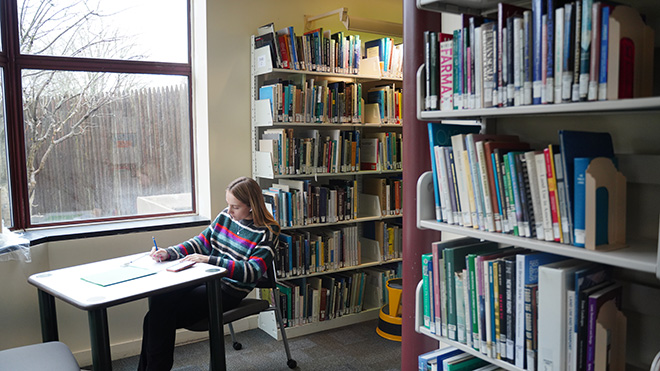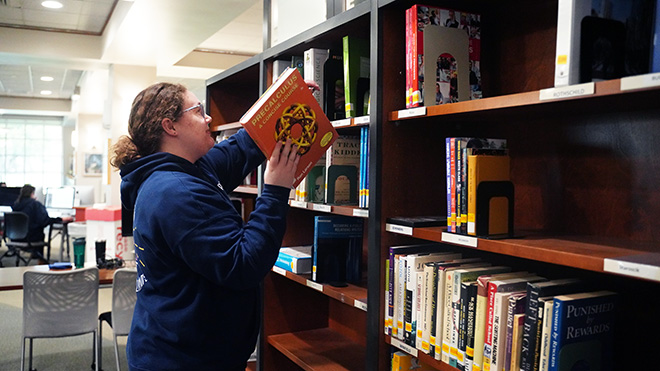More Than Books: 3 Lesser-Known Resources of RWU’s University Library
From the Architecture Library to one-on-one research consultations, learn more about these hidden gems from library staff

BRISTOL, R.I. – At the heart of campus, the Roger Williams University Library is home to the Center for Student Academic Success, Student Accessibility Services, Tutoring Center, and Peer Mentorship Program. This hub acts not only as a quiet getaway for students to study, print assignments, and work with peers on projects, but it also provides a variety of resources dedicated to promoting students’ academic success and endeavors.
“The University Library is the crossroads of knowledge, culture, information, making, and learning. It’s an open space for the RWU community to research, create, test ideas, and engage in conversations concerning the most immediate issues of our day. We offer books, hundreds of electronic resources, archives, public programs, a makerspace, and so much more,” said Adam Braver, Interim Dean of University Library Services. “With our commitment to academic freedom and freedom of expression, the library truly is the community space where information and thought lives, and where ideas can be formed.”
In honor of National Library Week, running April 7-13, library staff share three hidden gems of the University Library system.

Architecture Library Not Just for Architecture Majors
The standalone Architecture Library, located in the Cummings School of Architecture, is open to the entire RWU community, according to Architecture/Art Librarian John Schlinke. While not housed within the University Library building, it is a part of the library system. Among its vast collection, the library holds approximately 23,500 circulating print volumes, 780 reference print volumes, 1,000 CSA student theses, and 135 recent print journal subscriptions. The library also subscribes to hundreds of online journals and databases and thousands of online books available to students. Though these materials primarily consist of subjects related to architecture, urban design, and historic preservation, students from a multitude of disciplines such as Construction Management and Engineering can benefit from access to information related to designing foundations, bridges, tunnels, and a yearly RS Means subscription that produces cost estimates on electrical, mechanical, and interior construction, Schlinke shared.
In addition to a welcoming faculty, this two-floor library is packed with public computers, color printers, flat-bed scanners (12 inches by 17 inches; 19 inches by 25 inches), KIC Bookeye 5 overhead scanners, Nikon slide scanners, and individual or group seating free for all of the RWU community to use.
Research Consultations Offer Personalized Assistance from Library Staff
During a one-on-one research consultation, students receive personalized guidance from one of many library specialists, in person or online. These sessions provide students with a research expert's set of eyes to help dive into very narrow topics that may seem challenging. Librarians can assist with defining a research topic or question, looking for keywords, research databases, and critical authorship in a specific discipline.
For RWU Collections Strategies Librarian Haley Lott, consultations are a powerful tool that help students take an interdisciplinary approach to problems and projects. These consultations enable a look at how a topic intersects with one's interests and what a student is learning in other classes, helping students think about where that research exists, who that research is coming from, and how to get access to it here on campus. “I was in a class last year, and the professor said that grades went up at least one letter grade higher than average for people who took advantage of working with the library,” Lott said.
To set up an appointment, students can email a librarian directly or schedule a consultation on the RWU library webpage.

Free RefWorks Tool Makes Citing Sources Easier
RefWorks is a citation management tool, provided free to all RWU students and faculty. Students can input bibliographic information, and the tool will formulate citations and automatically generate a bibliography. RefWorks provides a variety of citation styles that can be easily manipulated per assignment requirements. Students can use this tool to organize research projects and citations into folders that they can easily access for future references and assignments. This can be a highly beneficial tool for group work because the folders can be shared directly with people for research collaboration. RefWorks can also interface with word processing documents such as Microsoft Word and Google Docs to provide in-text citations and generate a bibliography.
